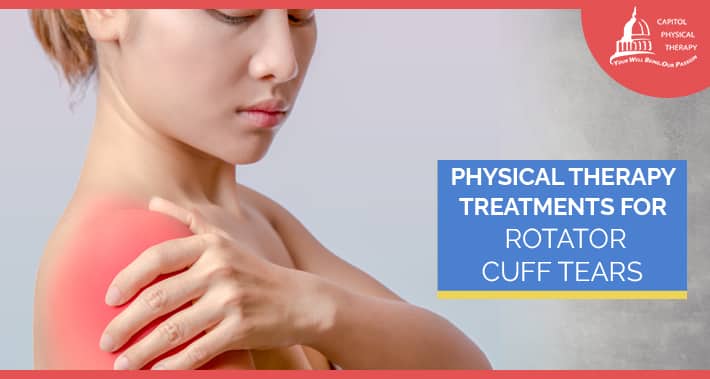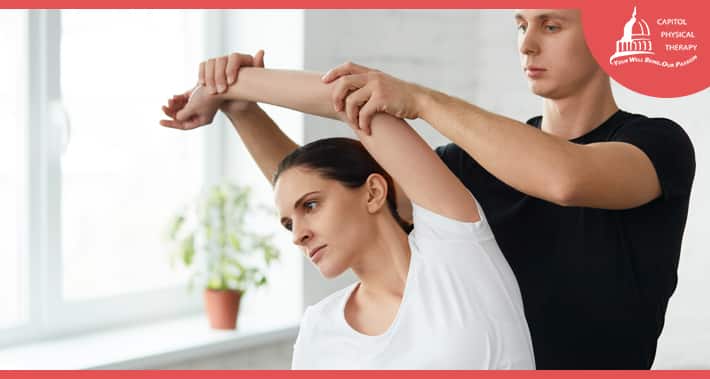
You use your shoulder for a wide variety of movements and activities.
However, the fact that it’s only supported by a relatively small muscle group makes it somewhat prone to injury.
These types of injuries are referred to as “rotator cuff tears”.
Rotator cuff tears typically occur either due to accident or trauma during activities such as heavy lifting or sports, or from repeated overuse.
While not always painful, a rotator cuff injury can cause you to lose function in your arm and shoulder for an extended period.
If you find yourself with a rotator cuff injury, then the best course of action is to seek sports injury physical therapy from a physical therapist at Capitol Physical Therapy.
Let’s look in more detail about the symptoms and causes of rotator cuff tears.
What Is Your Rotator Cuff?
The rotator cuff is a group of muscles and tendons that support the shoulder.
RELATED: What Happens When You Pull A Muscle?
These muscles and tendons in your shoulder work together to stabilize and move your joints.
The rotator cuff runs from the top of your upper arm bone (the humerus) to your shoulder blade (scapula).
According to Johns Hopkins Medicine, your rotator cuff is one of the most important parts of your shoulder.
This is partially because you use your rotator cuff muscles for an incredibly wide variety of activities, ranging from everyday tasks such as getting dressed and eating to hobbies like weightlifting and playing sports.
What Is A Rotator Cuff Tear?
As we previously mentioned, a rotator cuff tear is a shoulder injury which typically occurs following accidents or repeated overuse.
It may be classified as either a full thickness tear, which extends through the whole muscle/tendon, or partial thickness tear, which affects part of the cuff but does not extend all the way through.
These types of injuries fall into one of three categories:
Rotator Cuff Strains And Tears
Your muscles are connected by strong, flexible rope shaped tissues known as tendons.
Rotator cuff strains and tears occur when your tendons tear or stretch too far.
This most commonly happens as a result of an accident or a fall.
RELATED: Physical Therapy For Fall Prevention
Tendinitis
Tendinitis causes inflammation in your rotator cuff.
Much like repetitive strain injuries, tendinitis is typically the result of repeated overuse and repetitive motion.
For this reason, it’s a common injury amongst tennis players and other athletes who use repetitive shoulder motion.
Bursitis
Bursitis also causes inflammation.
In shoulder bursitis, the inflammation develops in your bursa, which are the fluid filled sacs located between the tendons of your rotator cuff and your shoulder bones.
Rotator Cuff Injury Symptoms
If you are experiencing a rotator cuff injury, you may notice some of the following symptoms:
- A progressive feeling of weakness or heaviness in the arm or shoulder
- Pain on the top of the shoulder that runs down the outside of the arm
- Pain or tenderness when reaching overhead
- Loss of full range of motion of the shoulder, including the inability to lift the arm above the head or to reach behind the back
- Difficulty sleeping on the affected side and increased pain in the shoulder at night
Depending on the type and severity, a rotator cuff tear may or may not cause pain.
There are two categories of tear: acute or chronic.
Let’s take a closer look at both.
What Causes Acute Rotator Cuff Tear?
An acute rotator cuff tear is the result of an accident or sudden trauma involving your shoulder.
In some cases, the tear may occur when you attempt to lift a very heavy object.
It could also be the result of a fall where the shoulder joint is forced into an awkward position.
Acute rotator cuff tears are more common among young people.
What Causes Chronic Rotator Cuff Tear?
A chronic rotator cuff tear develops over time due to overuse.
Repetitive strain to the shoulder joint where the arm is above the shoulder for extended periods, such as, for example, throwing a ball, can lead to chronic rotator cuff injury.
Athletes are more at risk of chronic rotator cuff tears.
Aging is also a factor, as chronic rotator cuff tears are more common among people over 40.
And according to a 2022 study by Meng et al., your risk for experiencing a chronic rotator cuff tear drastically increases with age.
This makes rotator cuff tears a physical therapy for senior’s health issue.

Physical Therapy Treatment For Rotator Cuff Tears
Treatment for a rotator cuff tear can range from resting the muscle to surgery.
Whether or not surgery is necessary, getting a physical therapist involved is an important part of your recovery.
Your physical therapist will work with you to improve symptoms and slow the development of chronic pain and injury.
For acute injuries, your physical therapist will help you to manage your pain and prepare you for recovery.
In chronic cases, physical therapy serves to improve how your shoulder works, restoring range of motion and preventing more serious conditions from developing.
Your physical therapist may use any of the following methods to help improve your symptoms:
- Use of a sling to limit arm movements
- Application of heat and cold therapy to reduce swelling
- Showing you how to apply modifications to your physical activity to improve symptoms
- Exercises to restore range of motion
- Exercises to improve strength to the affected shoulder
- Dry needling to manage pain and reducing inflammation
RELATED: Dry Needling Physical Therapy Treatments
Phases Of Physical Therapy Rotator Cuff Tear Recovery
If your injury is severe enough to require surgery, it’s recommended that you work with a physical therapist during your recovery.
The phases of recovery are as follows:
Phase I
In the first phase of recovery, your shoulder will be protected as much as possible.
This includes always keeping your arm in a sling.
You may need assistance doing everyday tasks, such as bathing or preparing meals.
Your physical therapist will teach you how to safely perform gentle range of motion exercises.
Gentle massage, cold compression, or electrical stimulation to the area may also be used by your physical therapist as part of your pain management plan.
Phase II
As you begin to heal, you’ll require moderate protection of the affected shoulder as movements are introduced to improve mobility.
You’ll still wear a sling, but not all of the time.
Your physical therapist will introduce exercises to strengthen your core and shoulder blade muscles.
RELATED: Health Benefits Of Pilates
You may begin to use your arm again for simple tasks but must refrain from heavy lifting.
Phase III
In the third phase, the focus shifts to restoring balance to your body by improving muscle strength to the affected side.
Your physical therapist may recommend a modified weight lifting program as well.
You may regain full use of your arm, but still be unable to return to work or regular sporting activities, avoiding all strenuous activity on the affected side.
Phase IV
In the final phase, you will work closely with your physical therapist as you return to work or sports.
You may be required to practice your everyday activities with your physical therapist present to support recovery.
Your physical therapist will help you build muscle strength as well, while learning how to safely protect the area and avoid further injury.
Book Your Appointment With Capitol Physical Therapy Today
Have you been diagnosed with a rotator cuff tear?
Whether acute or chronic, our physical therapists at Capitol Physical Therapy are expertly trained to help you recover from your rotator cuff injury.
We can help you return to full strength while alleviating your symptoms along the way.
If you are recovering from surgery, working with a physical therapist will speed up your recovery process.
We even offer telehealth physical therapy to help support your recover from the comfort of your own home.
Book your appointment with Capitol Physical Therapy today and let us help you get back to full health.
1331 H St NW #200,
Washington, DC 20005
- https://g.page/capitolptdc
9560 Pennsylvania Ave. # 202,
Upper Marlboro, MD 20772
- https://goo.gl/maps/zjL4NnnuThRhrcS86
Capitol Physical Therapy offers orthopedic and other pain related solutions, with our versitile team of physical therapists in Washington, DC